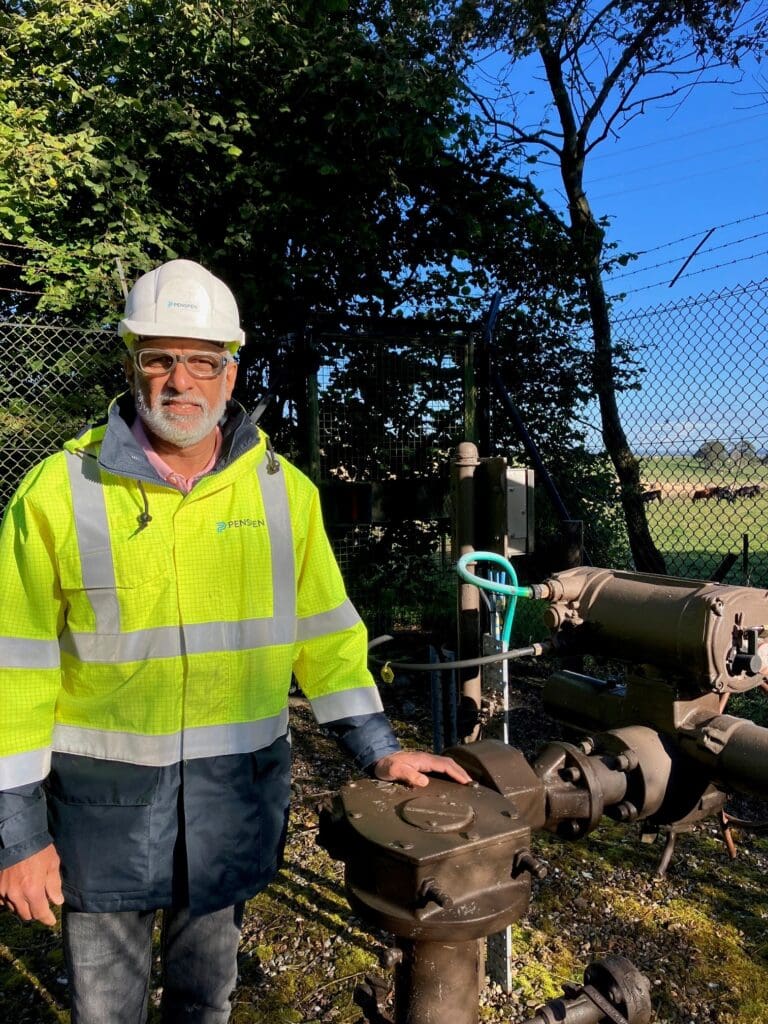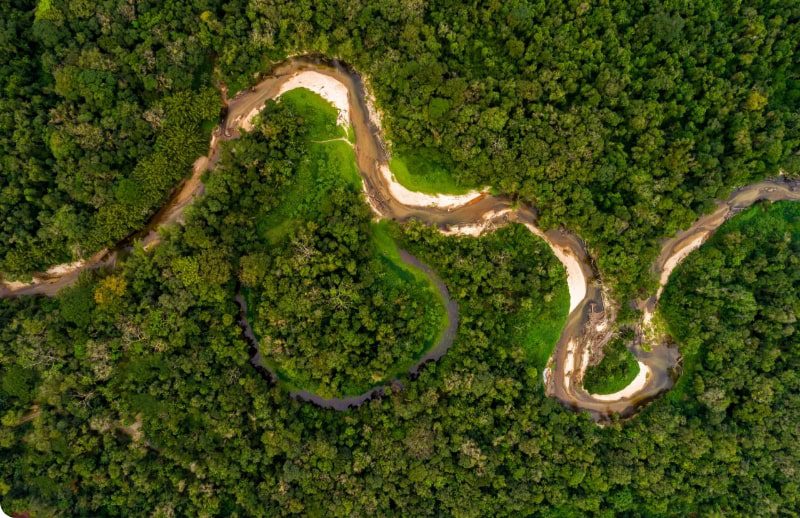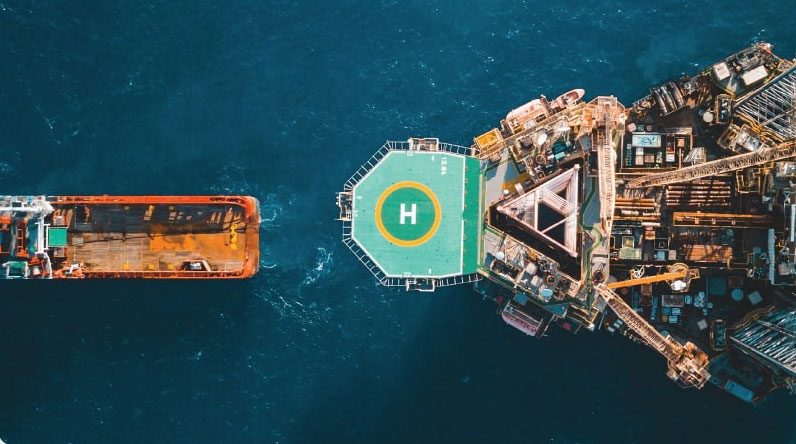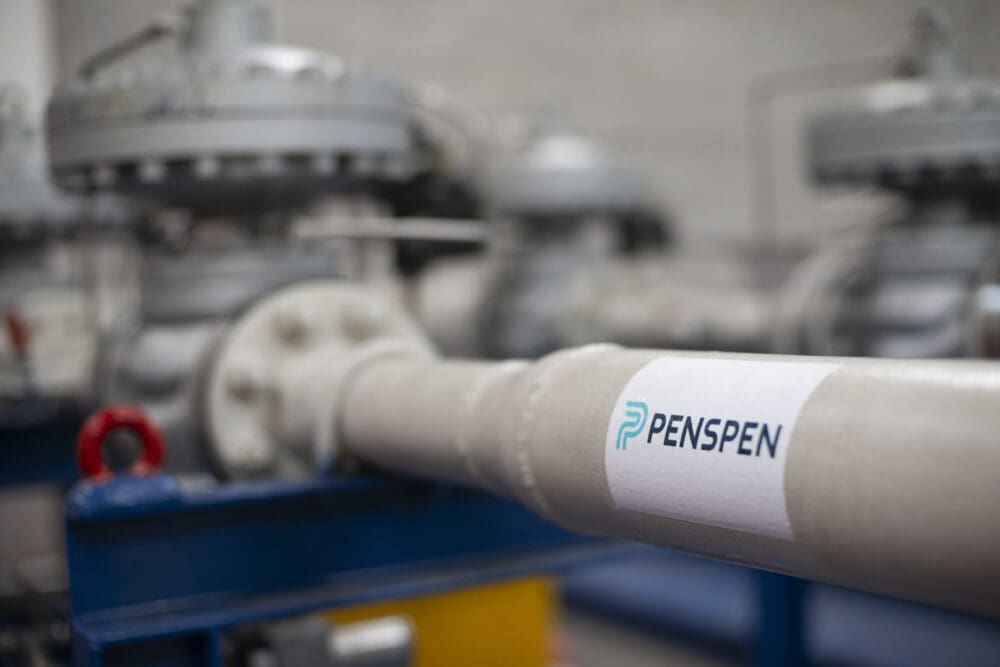The energy industry is changing at a rate never seen before. As operators balance the transition to lower carbon energy sources with the need for energy security, the work of our teams has never been more critical.
Three Penspen technicians – Alan, George, and Sean – have racked up more than 145 years’ experience combined in the gas industry, so we caught up with them about what’s changed in the decades they’ve been involved in gas pipeline maintenance, how skillsets have changed, and their advice for future generations of gas technicians.

1. What first attracted you to the gas/oil maintenance industry, and how did you get started?
I would like to say what first attracted me to the gas industry was the combination of being a part of an industry providing an essential service that emphasises teamwork, safety and responsibility. However, the reality was a chance meeting with a former school friend who mentioned that he was an apprentice at North West Gas and suggested I applied for an apprenticeship there.
2. Looking back, what are some of the most memorable jobs, sites, or projects you’ve worked on?
The first time ascending the MAN holder at Jackson St, St Helens on a fine day and the views from 300ft up, plus walking on the crown of the holder and thinking ‘this steel does not feel very substantial!”
Living in St Helens, which at that time had a large glass industry, working in various glass plants and passing furnaces I then realised my job was not so bad. Also my first time as an apprentice assembling a governor auxiliary from scratch – solo. These were jobs from my early years in the industry, but the memories are still strong.
3. How has the day-to-day work of a technician changed since you started?
When I finished my apprenticeship I qualified as a Governor Craftsman. Technicians were viewed as the chosen ones – I joined their ranks 10 years later!
In the early days there was more variation of work tasks, routine maintenance on governors, gas holders (spiral and column guided), assisting on jobs with other departments (Distribution, I and C), district pressure issues and surveys. Now most of the work is IGTs or NGM, so there’s maybe less variety but improved conditions.
4. What were the biggest challenges you faced early on compared to now?
My biggest challenge initially was being away from home for 26 weeks a year for three years. The diverse types of equipment you were expected to work on and maintain, gaining experience and competence. Plus, early supervisors had limited exposure to any form of gas control equipment.
5. Which tools, safety practices, or technologies have made the biggest difference over the years?
Basic hand tools have not changed a great deal over the years. Battery operated tools can make a technician’s life easier than it was. Safety practices have improved over the years or another way of looking at it is that the implementation of safety practices is now more strictly enforced. iPads, laptops and mobile phones have made communicating easier and information more readily available.
Old days – Water gauge, dial gauges, Gascoseeker MK1, and the never-to-be-forgotten Pager!
Now – Digital gauges, Gascoseeker MK2, personal gas monitors, mobile phone, laptop, or iPad.
6. What skills do you think are just as important today as they were 45 to 50 years ago?
- A willingness to learn from the start
- Correct application of accrued knowledge
- Patience – things do not always go the way you wish or expect them to
- Teamwork – it is not wrong to ask for help or guidance if you have a problem
- Implementation of safety guidelines/ practices
- Respect – of others be they work colleagues, support staff or just the person passing your work area.
7. What has kept you motivated and committed for so long?
Over recent years it has been observing people learn, develop, and improve their skills.
Since my early days at Northwest Gas (now Cadent) I have enjoyed my job, built friendships, and improved my knowledge along the way, as well as passing on my knowledge to others. My life in the gas industry for the most part has been good.
8. Can you share a moment when teamwork really made the difference on the job?
A lifetime ago, I was on standby and there was a serious MP incident in Runcorn. To facilitate repair, it was necessary to reduce the gas pressure in the MP main from 0.9 Bar down to 150 mbar. The valve to control this reduction was approximately 4-miles from the monitoring point (or the last governor on that leg). The monitoring team had to be in continuous contact with the valve operators ensuring the pressure was kept around 150 mbar at the inlet to the governor for 8–10 hours. A small part in a much larger job but we successfully kept gas in the system, and the repair was completed.
9. What advice would you give to younger technicians starting their careers today?
- Pay attention to how people communicate around you – listen and hear what is said to you.
- Do not be afraid to ask for clarification if you are given a task and are unsure.
- Ask how or why a task is done a certain way.
- Show pride in doing good work, even on small tasks. Do not cut corners.
- Learn the safety rules and use correct PPE. Take safety seriously.
- Be reliable, be on time and have a good attitude and work ethic.
10. What achievement are you most proud of in your career?
Obtaining an HNC as a mature student. To still be working in the gas industry and being relatively healthy is an achievement that I did not expect to happen when I first started at NWG.
11. What does reaching this milestone mean to you personally?
Reaching this point, I feel gratitude for what has been accomplished and the people that helped me along the way, and unfortunately grief when remembering friends at work that are no longer here.

1. What first attracted you to the gas/oil maintenance industry, and how did you get started?
In 1974, my Dad worked in Grid control at Wavertree. He got me an apprenticeship, and I originally started in Plant department at Ward Street, Prescot.
2. Looking back, what are some of the most memorable jobs, sites, or projects you’ve worked on?
At midnight on New Years Day in 2000, due to the Y2K major concern, we were monitoring the sites to ensure that telemetry systems didn’t fail. All was okay and the overtime wasn’t too bad that night either.
3. How has the day-to-day work of a technician changed since you started?
When I first started, I would take care of storage holders, Emergency control on area distribution systems and ‘sector proven’. ‘Sector proven’ would in entail bringing in the North Sea Natural Gas and push out the old town’s gas. This was a two-day event throughout day and night. However, these tasks are no longer required.
4. What were the biggest challenges you faced early on compared to now?
My early days challenges were emergency call outs throughout night. My biggest challenges today would be IT and interrogating loggers.
5. Which tools, safety practices, or technologies have made the biggest difference over the years?
The vast improvement of PPE. On the tools sides, I suppose, electric crystal gauges. To think we use to measure pressures by using a mercury gauge!
6. What skills do you think are just as important today as they were 45 to 50 years ago?
To keep a cool head when you’re working under pressure.
7. What has kept you motivated and committed for so long?
I still find the job interesting. I still enjoy teaching younger technicians who are going through their time like Cal White and Jamie Garner.
8. Can you share a moment when teamwork really made the difference on the job?
Two years ago, Cal and I reinstalled the water Bath Heater at BP Saltend. It was a long gruelling week, but we got a result in the end and managed to get the Water Bath Heater back online.
9. What advice would you give to younger technicians starting their careers today?
With regards to safety, doing the right thing is never wrong.
10. What achievement are you most proud of in your career?
Becoming a Transmission Technician in 1982. It was a promotional step up back in the day and to have been asked was a real honour.
11. What does reaching this milestone mean to you personally?
I’m just glad I’m still fit enough to do the job.

1. What first attracted you to the gas/oil maintenance industry, and how did you get started?
I would like to say what first attracted me to the gas industry was the combination of being a part of an industry providing an essential service that emphasises teamwork, safety and responsibility. However, the reality was a chance meeting with a former school friend who mentioned that he was an apprentice at North West Gas and suggested I applied for an apprenticeship there.
2. Looking back, what are some of the most memorable jobs, sites, or projects you’ve worked on?
The first time ascending the MAN holder at Jackson St, St Helens on a fine day and the views from 300ft up, plus walking on the crown of the holder and thinking ‘this steel does not feel very substantial!”
Living in St Helens, which at that time had a large glass industry, working in various glass plants and passing furnaces I then realised my job was not so bad. Also my first time as an apprentice assembling a governor auxiliary from scratch – solo. These were jobs from my early years in the industry, but the memories are still strong.
3. How has the day-to-day work of a technician changed since you started?
When I finished my apprenticeship I qualified as a Governor Craftsman. Technicians were viewed as the chosen ones – I joined their ranks 10 years later!
In the early days there was more variation of work tasks, routine maintenance on governors, gas holders (spiral and column guided), assisting on jobs with other departments (Distribution, I and C), district pressure issues and surveys. Now most of the work is IGTs or NGM, so there’s maybe less variety but improved conditions.
4. What were the biggest challenges you faced early on compared to now?
My biggest challenge initially was being away from home for 26 weeks a year for three years. The diverse types of equipment you were expected to work on and maintain, gaining experience and competence. Plus, early supervisors had limited exposure to any form of gas control equipment.
5. Which tools, safety practices, or technologies have made the biggest difference over the years?
Basic hand tools have not changed a great deal over the years. Battery operated tools can make a technician’s life easier than it was. Safety practices have improved over the years or another way of looking at it is that the implementation of safety practices is now more strictly enforced. iPads, laptops and mobile phones have made communicating easier and information more readily available.
Old days – Water gauge, dial gauges, Gascoseeker MK1, and the never-to-be-forgotten Pager!
Now – Digital gauges, Gascoseeker MK2, personal gas monitors, mobile phone, laptop, or iPad.
6. What skills do you think are just as important today as they were 45 to 50 years ago?
- A willingness to learn from the start
- Correct application of accrued knowledge
- Patience – things do not always go the way you wish or expect them to
- Teamwork – it is not wrong to ask for help or guidance if you have a problem
- Implementation of safety guidelines/ practices
- Respect – of others be they work colleagues, support staff or just the person passing your work area.
7. What has kept you motivated and committed for so long?
Over recent years it has been observing people learn, develop, and improve their skills.
Since my early days at Northwest Gas (now Cadent) I have enjoyed my job, built friendships, and improved my knowledge along the way, as well as passing on my knowledge to others. My life in the gas industry for the most part has been good.
8. Can you share a moment when teamwork really made the difference on the job?
A lifetime ago, I was on standby and there was a serious MP incident in Runcorn. To facilitate repair, it was necessary to reduce the gas pressure in the MP main from 0.9 Bar down to 150 mbar. The valve to control this reduction was approximately 4-miles from the monitoring point (or the last governor on that leg). The monitoring team had to be in continuous contact with the valve operators ensuring the pressure was kept around 150 mbar at the inlet to the governor for 8–10 hours. A small part in a much larger job but we successfully kept gas in the system, and the repair was completed.
9. What advice would you give to younger technicians starting their careers today?
- Pay attention to how people communicate around you – listen and hear what is said to you.
- Do not be afraid to ask for clarification if you are given a task and are unsure.
- Ask how or why a task is done a certain way.
- Show pride in doing good work, even on small tasks. Do not cut corners.
- Learn the safety rules and use correct PPE. Take safety seriously.
- Be reliable, be on time and have a good attitude and work ethic.
10. What achievement are you most proud of in your career?
Obtaining an HNC as a mature student. To still be working in the gas industry and being relatively healthy is an achievement that I did not expect to happen when I first started at NWG.
11. What does reaching this milestone mean to you personally?
Reaching this point, I feel gratitude for what has been accomplished and the people that helped me along the way, and unfortunately grief when remembering friends at work that are no longer here.
- Thanks so much to Alan, Sean and George for sharing their stories!
Related Insights
Curiosity, Commitment, and Corrosion: Our People – Yureis Villasmil
Passionate about personal development, integrity engineer Yureis shares how her her work contributes to the safe and sustainable delivery of energy throughout Latin America. ...

A New Landscape: Our People – Nick Molnar
Nick is a Senior Pipeline Integrity Engineer at Penspen. Since joining the team in November 2024 and relocating from Canada to Abu Dhabi, he’s been an integral part of Penspen’s Centre of...

Our People: Half a Century of Gas Maintenance
Three Penspen technicians - Alan, George, and Sean - have racked up more than 145 years' experience combined in the gas industry, so we caught up with them about what's changed in the decades they've...

“Technology never stops evolving”: Our People – Israa
Ahead of Saudi National Day 2025, Israa shared why she chose Penspen to build her career in the Kingdom of Saudi Arabia, and why she’s so proud of the projects Team Penspen are delivering in the...




